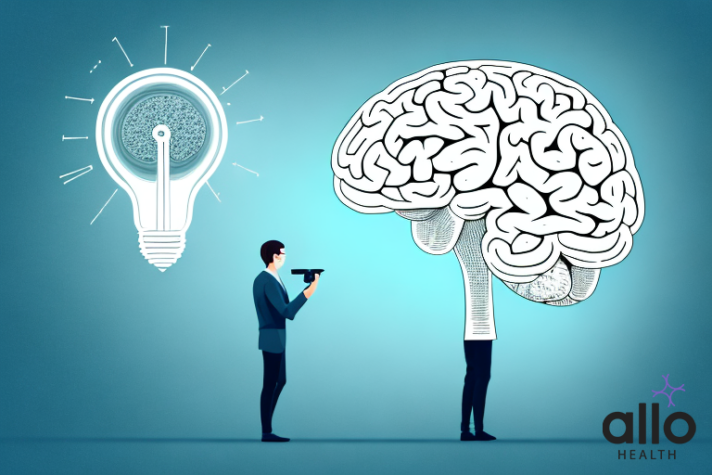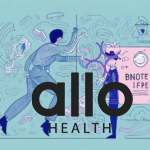Finding The Right Porn Addiction Doctor For Your Needs

Allo Health is dedicated to personalized well-being, offering support and trusted information tailored to individual health goals. The platform emphasizes human-generated content, led by a distinguished medical team of experts, including physicians and sexual health specialists. Their commitment to credibility involves rigorous fact-checking, authoritative research, and continuous updates to ensure accurate, up-to-date information. Allo Health's unique approach goes beyond conventional platforms, providing expert-led insights and a continuous commitment to excellence, with user feedback playing a crucial role in shaping the platform's authoritative voice.

Dr Sanina Mansoor holds MBBS degree from Yenepoya university,Mangalore.She has 8 years of experience working as a medical officer at various health centres and medical colleges.
Why This Was Upated?
Our experts continually monitor the health and wellness space, and we update our articles when new information became available.
Updated on 17 January, 2024
- Article was updated as part of our commitment to diversity, equity, and inclusion.

"The following blog article provides general information and insights on various topics. However, it is important to note that the information presented is not intended as professional advice in any specific field or area. The content of this blog is for general educational and informational purposes only.
Book consultation
The content should not be interpreted as endorsement, recommendation, or guarantee of any product, service, or information mentioned. Readers are solely responsible for the decisions and actions they take based on the information provided in this blog. It is essential to exercise individual judgment, critical thinking, and personal responsibility when applying or implementing any information or suggestions discussed in the blog."
Porn addiction is a complex and challenging concern that affects millions of individuals worldwide. Oftentimes, people who struggle with porn addiction face difficulty in overcoming it without professional assistance. This is why seeking the help of a qualified porn addiction doctor can be life-saving. But how do you go about finding the right porn addiction doctor for your needs? In this article, we will guide you through the process of finding the ideal porn addiction doctor and explain why seeking professional help is crucial for your recovery.
The Signs of Porn Addiction
It’s important to note that I am not a mental health professional, and the information provided here should not be considered a substitute for professional advice. Porn addiction, like any other addiction, is a complex and controversial topic, and there is ongoing debate within the mental health community about its classification and treatment. That being said, here are some potential signs that someone may be struggling with porn addiction:
- Excessive Time Consumption: Spending a significant amount of time viewing pornographic material, to the detriment of other responsibilities, such as work, relationships, or personal interests.
- Loss of Interest in Other Activities: A reduction or loss of interest in activities that were once enjoyable or fulfilling, as the individual becomes increasingly preoccupied with pornographic material.
- Failed Attempts to Cut Down: Repeatedly attempting to cut down or control the consumption of pornography without success.
- Neglect of Responsibilities: Neglecting responsibilities at work, school, or home due to excessive consumption of pornographic material.
- Relationship Concerns: Experiencing concerns in personal or professional relationships, possibly due to secrecy, lying, or neglect stemming from the addiction.
- Escalating Usage: Needing to consume more explicit or extreme forms of pornography over time to achieve the same level of arousal or satisfaction.
- Inability to Stop Despite Negative Consequences: Continued use of pornography despite awareness of negative consequences, such as relationship concerns, health concerns, or legal trouble.
- Preoccupation with Pornography: Constantly thinking about or planning the next opportunity to consume pornographic material.
- Distress and Impairment: Experiencing significant distress, anxiety, or impairment in functioning as a result of the pornography consumption.
- Withdrawal Symptoms: Feeling irritable, restless, or anxious when attempting to cut down or stop the consumption of pornography.
It’s crucial to approach the topic with sensitivity, as there is ongoing debate about the existence of “porn addiction” and its classification within the field of mental health. If you or someone you know is struggling with concerns related to pornography consumption, it is advisable to seek professional help from a mental health professional or therapist who specializes in sexual health. They can provide a thorough assessment and appropriate guidance based on the individual’s specific circumstances.

When You Should Seek Professional Help for Porn Addiction
Deciding when to seek professional help for concerns related to pornography consumption can be subjective and depends on the individual’s experiences and the impact on their life. There are certain signs and situations that may indicate it’s time to seek professional assistance:
- Interference with Daily Life: If pornography use is interfering with daily activities, responsibilities, and relationships, it may be a sign that professional help is needed. For example, if someone is neglecting work, studies, or family obligations due to excessive porn consumption, seeking help is advisable.
- Failed Attempts to Control Usage: If someone has repeatedly tried to cut down or control their use of pornography without success, it may be an indication that the behavior is beyond their ability to manage independently.
- Negative Consequences: When there are negative consequences associated with pornography consumption, such as strained relationships, legal concerns, or physical health concerns, seeking professional help is crucial.
- Distress or Emotional Impact: If the individual experiences significant distress, anxiety, guilt, or shame related to their pornography use, professional help can assist in addressing the emotional aspects of the behavior.
- Escalating Behavior: If there is an escalation in the intensity or extremeness of the pornography consumed, indicating a tolerance build-up, it may be a sign that the individual needs professional support to address the underlying concerns.
- Isolation or Secrecy: Engaging in secretive behavior or isolating oneself due to feelings of shame or guilt related to pornography use may warrant seeking professional help.
- Impact on Relationships: Relationship concerns, such as communication breakdowns, trust concerns, or intimacy concerns arising from pornography use, may signal the need for professional intervention.
- Lack of Control: If the individual feels a lack of control over their pornography consumption, despite wanting to cut down or stop, it may be an indication of a more significant concern that requires professional attention.
- Co-occurring Mental Health concerns: If there are underlying mental health concerns contributing to or exacerbated by the pornography use, such as depression, anxiety, or trauma, seeking help from a mental health professional is advisable.
- Personal Desire for Change: If the individual recognizes their problematic relationship with pornography and expresses a genuine desire to change, seeking professional assistance can provide the necessary support and guidance.
It’s important to approach the concern with empathy and understanding. Mental health professionals, such as psychologists, therapists, or counselors, can offer a confidential and non-judgmental space to explore the underlying factors contributing to the behavior and develop coping strategies. Seeking help early can contribute to a healthier relationship with sexuality and prevent further negative consequences.
Risks And Consequences of Untreated Porn Addiction
Untreated porn addiction can have a range of negative consequences, impacting various aspects of an individual’s life. It’s important to note that the concept of “porn addiction” and its classification within the mental health field is a subject of ongoing debate. Nevertheless, when problematic patterns of pornography consumption are left unaddressed, individuals may experience the following risks and consequences:
- Relationship concerns: Porn addiction can lead to strained relationships, as it may contribute to a lack of intimacy, communication breakdowns, and trust concerns. Partners may feel neglected, betrayed, or insecure.
- Sexual Dysfunction: In some cases, individuals with untreated porn addiction may experience sexual dysfunction, such as difficulty achieving or maintaining an erection, reduced libido, or challenges with real-life sexual intimacy.
- Negative Impact on Mental Health: Porn addiction can be associated with mental health concerns such as anxiety, depression, low self-esteem, and feelings of guilt or shame. Untreated, these mental health concerns can worsen over time.
- Isolation and Social Withdrawal: People struggling with porn addiction may isolate themselves due to feelings of shame or embarrassment. Social withdrawal can exacerbate feelings of loneliness and contribute to a cycle of increased porn consumption.
- Professional and Academic Consequences: Excessive use of pornography can lead to neglect of professional and academic responsibilities, resulting in decreased productivity, job performance concerns, or academic underachievement.
- Financial Implications: Some individuals may spend significant amounts of money on access to premium pornographic content or related services, leading to financial strain and consequences if these expenses are not managed.
- Legal concerns: In extreme cases, individuals may face legal consequences if their porn consumption involves illegal material or activities, such as sharing explicit content without consent.
- Distorted Sexual Attitudes and Expectations: Repeated exposure to explicit and often unrealistic sexual content can lead to distorted attitudes and expectations about sex, potentially impacting real-life relationships and sexual satisfaction.
- Escalation of Pornographic Material: Over time, individuals with untreated porn addiction may seek more extreme or novel forms of pornography to achieve the same level of arousal, potentially contributing to desensitization and increased tolerance.
- Impact on Self-Esteem: Persistent engagement in a behavior that one finds distressing or feels unable to control can contribute to a negative impact on self-esteem and self-worth.

It’s essential to approach the concern with empathy and understanding. Seeking professional help from mental health professionals, therapists, or counselors can provide support in understanding the underlying concerns contributing to the addiction and developing coping strategies. Early intervention is crucial to preventing the escalation of negative consequences and promoting overall well-being.
Finding The Right Porn Addiction Doctor for Your Needs
Finding the right professional to address concerns related to porn addiction involves careful consideration and research. Here are some steps to help you find a suitable doctor or mental health professional for your needs:
- Consult Your Primary Care Physician: Start by discussing your concerns with your primary care physician. They can provide referrals to specialists or mental health professionals who have experience in addressing addiction-related concerns.
- Search for Specialists: Look for mental health professionals who specialize in sex addiction, sexual health, or compulsive behaviors. This may include psychologists, psychiatrists, social workers, or counselors with expertise in addiction and sexual health.
- Check Credentials: Ensure that the professionals you consider are licensed and have the appropriate credentials in their field. Verify their qualifications through relevant licensing boards or professional organizations.
- Experience with Porn Addiction: Seek professionals who have experience specifically in addressing concerns related to porn addiction. They should be knowledgeable about the complexities of this behavior and its potential impact on mental health and relationships.
- Therapeutic Approach: Different therapists use different therapeutic approaches. Some common therapeutic modalities for addiction include cognitive-behavioral therapy (CBT), dialectical behavior therapy (DBT), or acceptance and commitment therapy (ACT). Research these approaches to see which resonates with you.
- Online Reviews and Recommendations: Look for online reviews or ask for recommendations from friends, family, or support groups. While personal experiences can vary, positive reviews or recommendations can be a good starting point.
- Contact Professional Organizations: Contact mental health professional organizations or addiction treatment associations for recommendations. They often have directories of professionals with expertise in various areas, including addiction.
- Telehealth Options: Consider whether you prefer in-person sessions or are open to telehealth options. Many therapists now offer online sessions, which can be convenient for individuals who may face barriers to in-person appointments.
- Initial Consultation: Schedule initial consultations with potential therapists to discuss your concerns, ask questions about their approach, and assess whether you feel comfortable working with them.
- Ask About Treatment Plans: Inquire about their approach to treatment and their proposed treatment plan. Understanding how they plan to address your specific concerns can help you make an informed decision.
- Cost and Insurance: Clarify the cost of sessions and whether the professional accepts your insurance. This information can help you plan financially for ongoing treatment.
- Trust Your Instincts: Trust your instincts during the initial consultations. A strong therapeutic alliance and feeling comfortable with your chosen professional are crucial for successful treatment.
Remember that seeking help for porn addiction is a personal decision, and finding the right professional may take time. It’s essential to be patient and persistent in your search to ensure you receive the support you need.
Most Asked Questions
-
What form of expert can help with porn addiction, and the way do I find a appropriate physician?
To deal with porn addiction, seek mental fitness experts like psychologists, psychiatrists, or counselors that specialize in intercourse dependancy. Start with the aid of consulting your number one care health practitioner for referrals. Ensure the chosen professional is certified, has applicable credentials, and experience in treating porn addiction.
-
What therapeutic approaches are powerful for treating porn dependancy?
Effective therapeutic modalities include Cognitive-Behavioral Therapy (CBT), Dialectical Behavior Therapy (DBT), and Acceptance and Commitment Therapy (ACT). These techniques help individuals recognize and alter their notion patterns, broaden coping skills, and commit to superb behavior changes.
-
Can I find a porn addiction medical doctor who offers on line sessions?
Yes, many therapists now offer telehealth alternatives for convenience. Consider whether or not you opt for in-person or on line sessions, and discover experts who provide virtual consultations. This flexibility can be beneficial, in particular for the ones dealing with limitations to in-man or woman appointments.
-
What ought to I expect for the duration of an preliminary session with a porn dependancy physician?
The initial consultation is an opportunity to talk about your concerns, ask questions about the doctor's technique, and verify whether you experience snug running together. It's a collaborative method where you may learn about their expertise and treatment plans.
-
How can I inquire about the cost and coverage coverage for sessions with a porn dependancy physician?
Before starting sessions, inquire approximately the price in line with session and whether the expert accepts your coverage. Understanding economic aspects guarantees you could plan for ongoing treatment with out surprising fees.






































